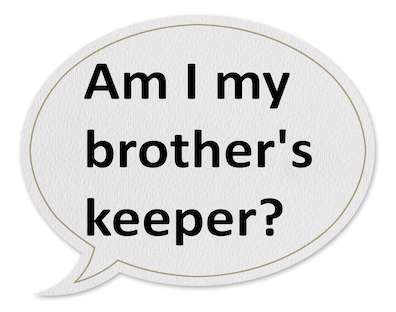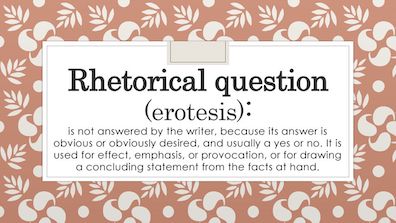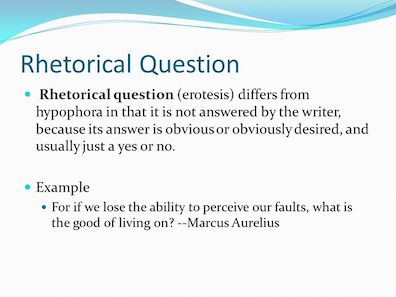Figure of speech. Picking up on Professor MacHugh's
observation that Stephen and O'Madden Burke look like
"communards," J. J. O'Molloy says, "Like fellows who had blown
up the Bastille," and then he makes the same point with a
question: "Or was it you shot the lord lieutenant of Finland
between you? You look as though you had done the deed."
Rhetorical theory calls this kind of interrogation erotesis
or erotema––making a point stronger by phrasing it as
a question that requires no answer.
Erotesis (eh-roh-TEE-sis, from Greek erotaein = to
question) is, like anacoenosis, a kind of
"rhetorical question." The difference, admittedly a fine one,
seems to be that erotesis drives home the speaker's point
simply through the emotional force of the question, with no
expectation of an answer. (In hypophora, the orator
answers his own question.) Gideon Burton (rhetoric.byu.edu)
offers the example, "Why are you so stupid?" Among other
examples, Richard Nordquist (thoughtco.com) cites Laertes'
response to the death of his sister in Hamlet, "Do you
see this, O God?" and Cicero's "How long, Cataline [sic],
will you abuse our patience?"
Although erotesis does not solicit an answer, it typically
implies that either Yes or No would do. John
Smith calls it "a figure whereby we either demand a
question, earnestly affirm, or vehemently deny a thing."
Affirmation and denial may seem to struggle for the upper
hand. In Elements of Composition and Rhetoric (1889),
Virginia Waddy writes that "declarative sentences are
expressed in the interrogative form" simply "to make the
statement more emphatic and convincing," but she goes on to
"observe two things: (1) A negative interrogation affirms.
Thus, 'Do we not bear the image of our Maker?' is but a
forcible way of saying, 'We bear the image of our Maker.' (2)
An affirmative interrogation denies. Thus: 'Doth God
pervert judgment? or doth the Almighty pervert justice?' Here
the effect is to deny or to give a negative answer to the
question" (109).
O'Molloy is only teasing his companions about their
countercultural attire, not conducting an oratorical tirade,
but his question, "was it you shot the lord lieutenant of
Finland between you?," displays a similar toggling
between Yes and No. A jesting answer to his question would be,
Yes, we're revolutionaries. Realistically, the answer
is, No, of course not. Playing along, Stephen splits
the difference: "We were only thinking about it." Robert
Seidman, who helpfully added erotesis (erotema) to
Gilbert's list of rhetorical figures, defines it as "the bold
assertion in the form of a question of the opposite of what
the question asks; as in 'Shall I be frighted when a madman
stares?'" It seems to me that the term could also be applied
to the question with which Myles Crawford concludes his paean
to Ignatius Gallaher: "Where do you find a pressman like
that now, eh?" Implicit answer: nowhere. Actual answer:
neither requested nor supplied.


